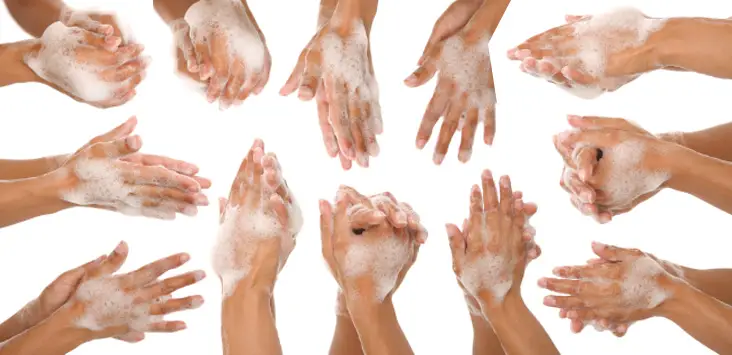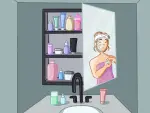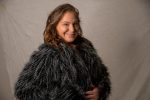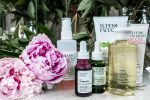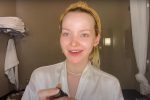Skincare Therapy
Turns out Argan oil is great for clearing up a lot of things.
By Amelia Williams, City College of San Francisco
I look in the mirror every morning.
I do an inspection shortened over the years by practice and patience. I check: my eyes, my teeth, my lips, my cheeks, my neck, my pores. I check for irregularities: fine lines, blocked pores, unplucked hairs, asymmetries. Then I cleanse my skin, once or twice depending on how much makeup I’ve worn and how much I’ve sweat. Then I tone my skin with a Japanese lotion, then I use a vitamin C serum, then I apply sunscreen. If it’s night time, I do my facial check, then I cleanse, tone, use an exfoliant for a day’s worth of dead skin, different serum, face oil, and cream. Maybe you have fewer steps and maybe you have more, but this is my ritual. This is a part of my coping with Obsessive Compulsive Disorder.
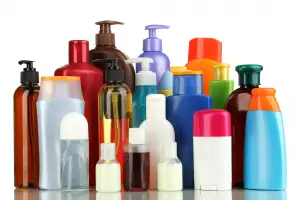
My diagnosis existed before I knew. My symptoms manifested in pre-school: I was neurotic, I wouldn’t eat most foods and I wouldn’t wear most things because the texture drove me to dark tantrums. I was filled with an anxiety that only bated when I yielded to my small obsessions. I thought I did a better job of hiding them than I actually did. When I was old enough to see repercussions for my actions, I became very shameful. I realized well before puberty that I was not normal; I knew that the things I did to feel relief were bizarre and that most people had no sympathy for how I dealt with my compulsions.
Time cured a good deal of them, but puberty exacerbated some of the worst, the ones that caused years of internal strife. I became neurotic about my appearance and obsessed with symmetry and equality, and unfortunately the human body is incapable of symmetry to my standards. I didn’t understand the futileness of trying to change the alignment of my eyes or mouth or jaw, or why the muscles of my dominant right side felt so much bigger and more pronounced than my left. These are things no one else I know thinks about, and it has taken this long for me to ever really discuss it publicly. But this is a story of healing and potent antioxidants.
My mother had and has never been one for vanity. She raised me to live by love and hard work, not beauty creams and lavish hairstyles, so my foray into performative femininity (in the forms of cosmetics, fashion, skincare) were stalled. Some slip into the norms of teenhood easily, but I was a slow learner. My first bouts with makeup came from theatre, something I was passionate about and that was so time-consuming I couldn’t afford to give energy to my compulsions. I loved the makeup because it was illusion: It “corrected” things on my face I couldn’t fix without a surgeon, and it distracted me from my dissatisfaction with my body.
But at this point I hadn’t realized yet the toll makeup can take on an unkept face. Because I wasn’t properly washing my face or taking care of it after the washing, I came to see makeup as negative, and swore it off in my day to day for many years. It wasn’t until I arrived at school in Vancouver, thousands of miles from anyone I knew, with a roommate who’s modeled for Tom Ford, that makeup became a shield again. The adjustment took a while, and the more my anxiety flared up the more outlandish I became with my looks.
The worse I felt, the better I looked. By the end of freshman year, I looked amazing and felt depressed as hell.
A lot of my old passions fell away during this time, and my following year at school, because I wasn’t brave enough to not go back. I stopped writing and dancing and creating art, and became a reader. I started with reading blogs of girls my age, who were beautiful and sad and aimless but whom took amazing care of their skin.
From there, it all became research. There was so much I wasn’t doing for my skin that down the line, would cause a lot of irreversible damage if I didn’t start now. Skincare became something of urgency for me, and I work best with a sense of urgency.
I started with ingredients. Whatever wasn’t beneficial I immediately threw out. I researched brands, formulas, acids, vitamins, tools, philosophies: I’m still researching. Skincare became an investment, and soon my bathroom became an intersection for vitamin C, foams, Argan oil, “essence,” peeling masks, sheet masks and more. My mother didn’t quite understand why.
Here’s why: It gives me control. My mental illness has always stemmed from a lack of control. All my rituals and neuroses are born of fear, anxiety and powerlessness at the chaos of the world. When I can line up a shelf of bottles and apply them to my skin, and visibly see my skin respond well to them, I am calm. The act of massaging my skin has also done wonders for my nail biting. It’s taken over a year to settle into this routine, and beyond a clear complexion, my mental complexion is much clearer too. Not perfect, by any means
When it comes to mental illness, I can only speak for myself. Over three million of my fellow Americans suffer with OCD symptoms, and that means there are over three million approaches to relieving them. What works for me now may become obsolete by the time I’m 22, but I can only live today. OCD is compounded by stress and fatigue. If you’re like me, or you think you might be, my advice starts with: take care of yourself.


